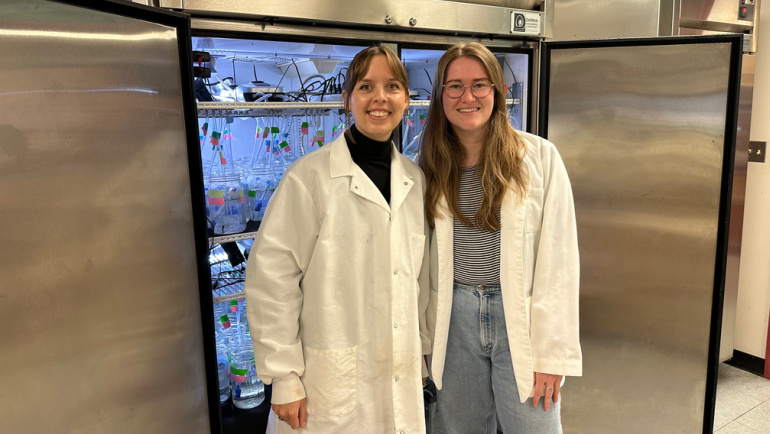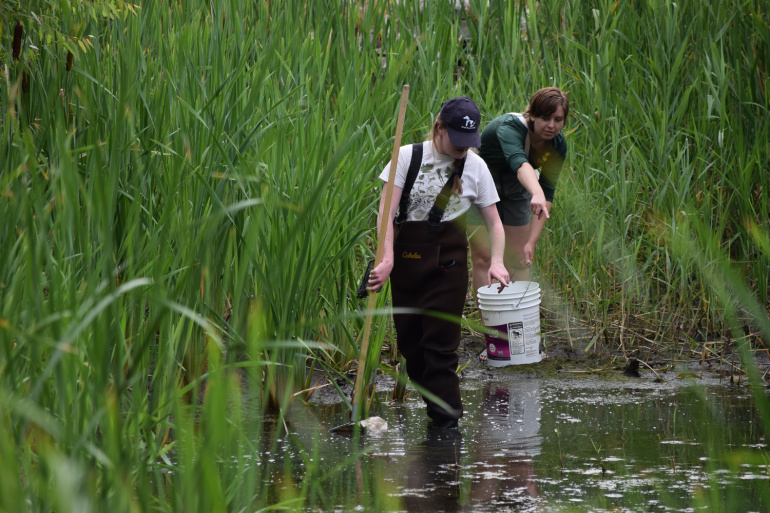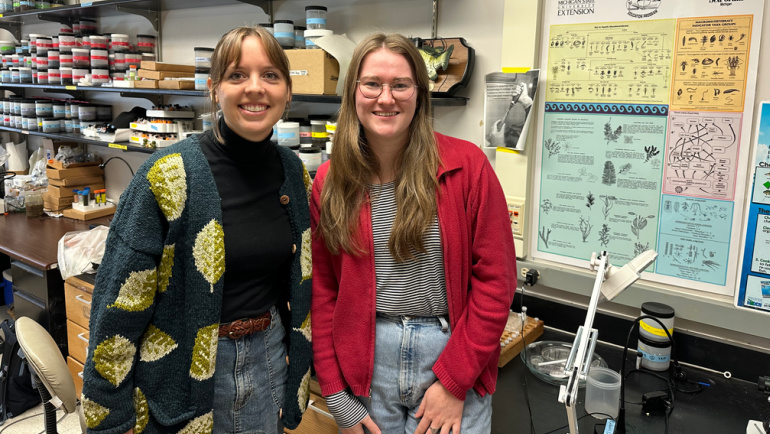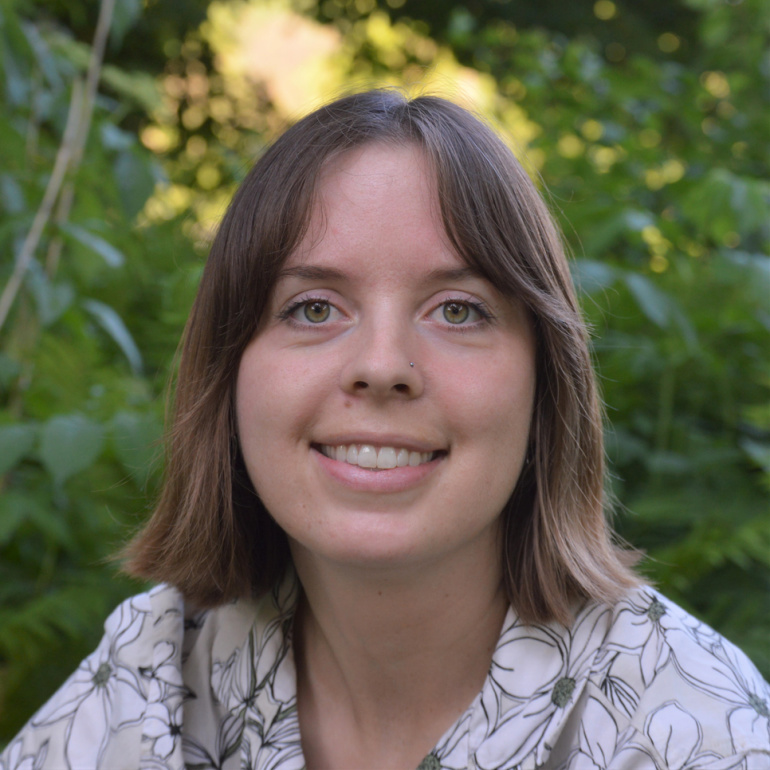
What could be better than being selected for a prestigious national fellowship? Being selected alongside one of your best friends.
Wayne State University biology Ph.D. students Brenna Friday and Katrina Lewandowski were both named Sea Grant Knauss fellows — and the only two selected from Michigan.
The Knauss Fellowship provides a unique educational and professional experience to graduate students with an interest in ocean, coastal and Great Lakes resources and in the national policy decisions affecting those resources. Knauss fellows are matched with hosts in the legislative and executive branches of government in the Washington, D.C. area for a one-year paid fellowship.

“I’m thrilled to be doing it with her,” Lewandowski said of Friday. “We first met in Donna Kashian’s lab, so we’re really good friends. You don’t want to compete against a friend, so we were nervous going into the process, but we both want the best for each other. We went into it hoping it worked out — and it did.”
Friday said that working with Lewandowski inspired her to work harder.
“It’s helpful having people who are experiencing the same trials and tribulations, and it’s wonderful to have that level of support from people who know the stresses of what you’re going through and can help you through things,” she said. “I’ll help somebody with an experiment that maybe I’m not very familiar with, and then I walk away having learned something new. There’s such a diversity of thought in the lab, and that is influential in all of our work because we’re constantly seeing how things in the environment fit together. It limits competition and highlights the ways that we can collaborate with and support each other.”
Lewandowski and Friday were both part of the National Science Foundation T-RUST (Transformative Research in Urban Sustainability Training) program with Kashian, a biology professor and director of environmental sciences at Wayne State.
 “The idea behind T-RUST was to train graduate students with a novel interdisciplinary approach,” Kashian said. “We focus a lot on environmental justice, which helped with Brenna and Katrina’s application. Additionally, they have to do community service every year. As part of T-RUST, graduate students come in and are paired with students in different disciplines — for instance, a biologist may be paired with an engineer and a communication student — and work on urban sustainability topics together.
“The idea behind T-RUST was to train graduate students with a novel interdisciplinary approach,” Kashian said. “We focus a lot on environmental justice, which helped with Brenna and Katrina’s application. Additionally, they have to do community service every year. As part of T-RUST, graduate students come in and are paired with students in different disciplines — for instance, a biologist may be paired with an engineer and a communication student — and work on urban sustainability topics together.
“Those interactions made a difference when they applied for the fellowship,” she continued. “I proofed both of their applications, and because of their experiences, they could answer the questions so easily and honestly about what they did to engage the community.”
Kashian noted that the Knauss Fellowship typically opens doors for students to thrive in their careers.
“Historically, people who get these positions end up in an excellent career path,” she said. “They tend to cross over into the policy line of work, which I don’t think a lot of Ph.D. students do. Ph.D. students typically go into research; Knauss Fellows have doors open where they can go down a path of policy, which potentially has more of an impact.”
Brenna Friday
Through the Knauss Fellowship, Friday will work in the Environmental Protection Agency’s Office of Water’s Office of Science and Technology as a biocriteria, nutrients and harmful algal blooms fellow.
“I've always wanted to be a scientist that does this type of research, but in graduate school I realized the value in informing policy as a scientist, being there to support policymakers, who are writing the rules for environmental regulations but don’t have the educational background that scientists do and shouldn’t be expected to dig into the literature and come to the same conclusions,” Friday said. “Scientists need to be that bridge to explain things in a way that is not too jargony or too technical. I’m excited to play that role.
“I also love understanding more about what government scientists are and what their job is, and how the work they are doing supports the environment, supports the American people and protects what we have. I appreciate the mission that’s behind the work being done.”
Friday has also been a key part of Wayne State’s Science Policy Network-Detroit (SciPol-Detroit), serving as the organization’s president. SciPol-Detroit aims to advocate for science- and evidence-based policies and narrow the gap between scientists, lawmakers and the public.
“Being a member of SciPol-Detroit played a huge part in my getting the fellowship,” said Friday, who traveled to Washington, D.C. with the group in the summers of 2022 and 2023 to meet with lawmakers. “Everything that we’ve done has highlighted how valuable our voices are in the ears of policymakers and communities in general. To be able to take what you’re learning in the lab and communicate its importance is critical. Just publishing papers is not an effective way to make change and address the problems we’re researching in our communities. I’m excited SciPol-Detroit and this fellowship have given me opportunities to take things one step further, beyond what graduate students normally do.”
She studies how developing frogs are affected by toxins in their environment, particularly by harmful algal blooms.
“Harmful algae blooms are a problem in the Great Lakes and particularly in Lake Erie, but also in the smaller lakes across the world, including Michigan,” Friday said. “Beach closures are common to prevent people and dogs from swimming and getting sick due to toxins released in the water. I realized that there was no research on how amphibians are affected. I felt like that was a problem because they spend their vulnerable tadpole stages in the water, and we don’t know how that toxin exposure is affecting them.
"My research has shown that they aren’t necessarily as negatively impacted as some organisms, but they are seemingly stressed to the point where they are developing more quickly,” she continued. “My thought is that they are doing that so they can get out of the pond faster because they’re stuck in a dangerous environment, but I imagine that comes with negative consequences as adults, and that’s something I’d be interested in later.”
Kashian considers Friday’s research to be outstanding.
“She’s had a brilliant project where she’s had to do more footwork than a lot of students because I’m not a frog expert,” Kashian said. “She’s quite smart. She always draws in huge crowds when she gives talks — everyone seems to love frogs. And she's going to be contributing some really novel information on how harmful algal blooms have surprising impacts on tadpoles.”
Katrina Lewandowski
As part of the Knauss Fellowship, Lewandowski will be a coastal resilience specialist for the National Oceanic and Atmospheric Administration.
Lewandowski noted that the T-RUST program drew her to Wayne State, and she considers it instrumental in her selection as a Knauss fellow.

“To tackle some of these complex issues, like invasive species or climate change, you really need a different approach,” she said. “The sustainability program allows us to work with people outside of academia, to network and take classes outside of our field, and to collaborate with researchers in other disciplines. Having that experience was really important for the application, and without this program, I definitely wouldn’t have gotten the fellowship.”
Lewandowski is also thankful for all the opportunities that WSU has given her.
“Wayne State does an awesome job of connecting students to opportunities that set us up for success outside of graduate school,” she said. “Another thing that’s really helped me here is being able to teach: Having that experience running a class is huge, and it has helped me learn skills outside of traditional research. I’m much more marketable to jobs with all my different experiences.”
Her research is primarily focused on zebra and quagga mussels and how they affect larval fish
“The invasive mussels were found around Lake Saint Clair,” Lewandowski said. “I'm interested in how their presence in the Great Lakes has affected fish that live here. Larval fish are susceptible to changes in diet early in their life, and it can affect how many of them survive to adulthood. Zebra and quagga mussels being in the lakes have over-filtered the water, so they actually affect the ecosystem and prey available to young fish. So, my dissertation is on how these larval fish are changing in response to the presence of zebra and quagga mussels.”
Kashian is eager to see what Lewandowski will do next.
“Katrina is incredibly humble but intensely sharp and focused while still able to see the broader picture in the way she does research,” she said. “Her attention to detail and creativity has allowed her tackle difficult research problems. Her work has been incredible.”
